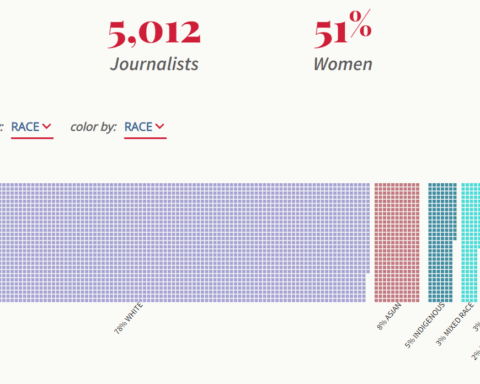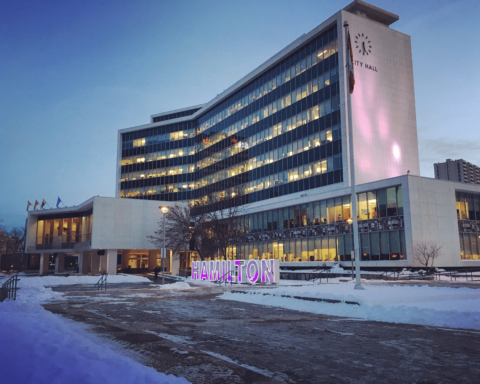The media is both a participant and a bystander in the ongoing debate around radicalization. On the one hand, it informs us of events that lead to violent acts of terrorism. On the other, some of the reporting and writing contributes to radicalization – the media itself can be an instigator.
The media is unarguably an excellent tool for communication and a traditional source for information. But it is also a forum for a concern about radicals recruiting youth and to debate whether media itself is a gateway for terror groups. Kavita Bedford, a Sydney, Australia writer and Mapping Frictions producer, has written about how media hysteria feeds narrower perceptions and the “demonization of Muslims in the media.”
“They [Islamic State] invite journalists to follow them through their blood rampages as shown in the six-part video series done by VICE. These are savvy, global broadcasts intended to draw a reaction from a global audience. These are messages calculated to give young radicalized Muslims a sense of power and draw from their sense of injustice,” writes Bedford.
Media: Guilty or Innocent – or Both?
When I asked if media could be an agent for radicalization in Muslim communities, professor Ghayda Hassan of the Université du Québec à Montréal is emphatic: “The answer is a clear yes. Media can play a significant role as an agent for radicalization. This operates when media uses sensationalist and polarizing discourses, by stigmatizing certain communities or using portrayals or discourses that can be ostracizing for targeted communities, namely Muslims in the current context.”
Hassan adds: “It does so also when it gives too much attention and coverage to radicalization-related incidents. By doing so, it gives credibility to these individuals and the ideas they promote, and it makes them more attractive to vulnerable youth.”
“The media certainly contributes to the overall ‘chatter’ in the air, and is often pointed to by members of the community for why they think Islamophobia is on the rise.” – Amarnath Amarasingam, Dalhousie University
When I sent the same question to Amarnath Amarasingam, a Social Science and Humanities Research Council of Canada Post-Doctoral Fellow in the Resilience Research Centre at Dalhousie University, he responded similarly.
“To call the media an ‘agent’ for radicalization is going too far,” he said. “However, the portrayal of Muslims – with the niqab debate, with [Ayaan] Hirsi Ali’s book tour talking about reform, to all of the conversations happening in Quebec, and discussions of whether there is something inherent in Islam that produces violence – all create an environment that Muslim youth have to navigate in their daily lives. This happens to an extent that other communities rarely experience.”
Amarasingam widens the perspective on the issue: “The media certainly contributes to the overall ‘chatter’ in the air, and is often pointed to by members of the community for why they think Islamophobia is on the rise. Many in the community are acutely aware that crimes by other communities or other individuals are rarely covered in the same way or to the same degree.”
However, it wouldn’t be correct to completely blame the media either. Yvonne Roberts, an award-winning journalist and writer, offers a perspective on the newsroom, stating it doesn’t have time to verify sources because of the heavy volume of material. “The news agenda is distorted. No story can be sat on long enough to examine the implications – reporters in the field are dealers in the immediate,” Roberts writes in her dialogue with Charlie Beckett, “Should the media rethink how they cover disasters?”
Avoiding Sensationalism and Oversimplification
So what does the media need to do differently when portraying radicalization? “Fortunately, media can also be a protective agent. It can do so by avoiding to portray radicalization-related events or individuals in a sensationalist manner and avoid to transform them into heroes or martyrs,” said Hassan.
“We use words like ‘vulnerable,’ ‘recruited’ or ‘lured,’ as if the individuals actually made no active choice to get involved. While this makes for good TV, it contributes little to understanding what we are dealing with.”
“I think the main thing that needs to happen is to understand radicalization as a multi-faceted process. Because of the limited time and space that some news programs and newspapers have, there is a tendency to boil down these complex processes to one cause, whether it is the Internet, or mental illness, or religion,” said Amarasingam.
Amarasingam also pointed out that specific words are used to describe radicalization, which could be perceived as derogatory. “We use words like ‘vulnerable,’ ‘recruited’ or ‘lured,’ as if the individuals actually made no active choice to get involved. While this makes for good TV, it contributes little to understanding what we are dealing with.”
Professor Charlie Beckett, a journalist and director of Polis in the department of media and communications at the London School of Economics, writes, “Proper hard, intelligent, critical news has to fight ever harder for people’s attention.” This echoes Richard M. Landau’s wish that “the media (especially the U.S. media) would separate news from sports and entertainment.”
It seems that media literacy skills have indeed become even more essential. Our opinions on different communities shouldn’t be based on news headlines – because feeding phobias may then prove those polarizing arguments that violent radicals are telling the youth.
Maria Ikonen has graduated with a M.A. in Media Science from University of Lapland and MSSc. in Journalism and Mass Communication from University of Tampere. A native of Finland, she is a member and active writer for Globalisti Magazine, a publication of Changemaker Finland that is an advocacy network working for global justice. She has written academic research about representations of masculinity and participated in research about religion in media culture.




